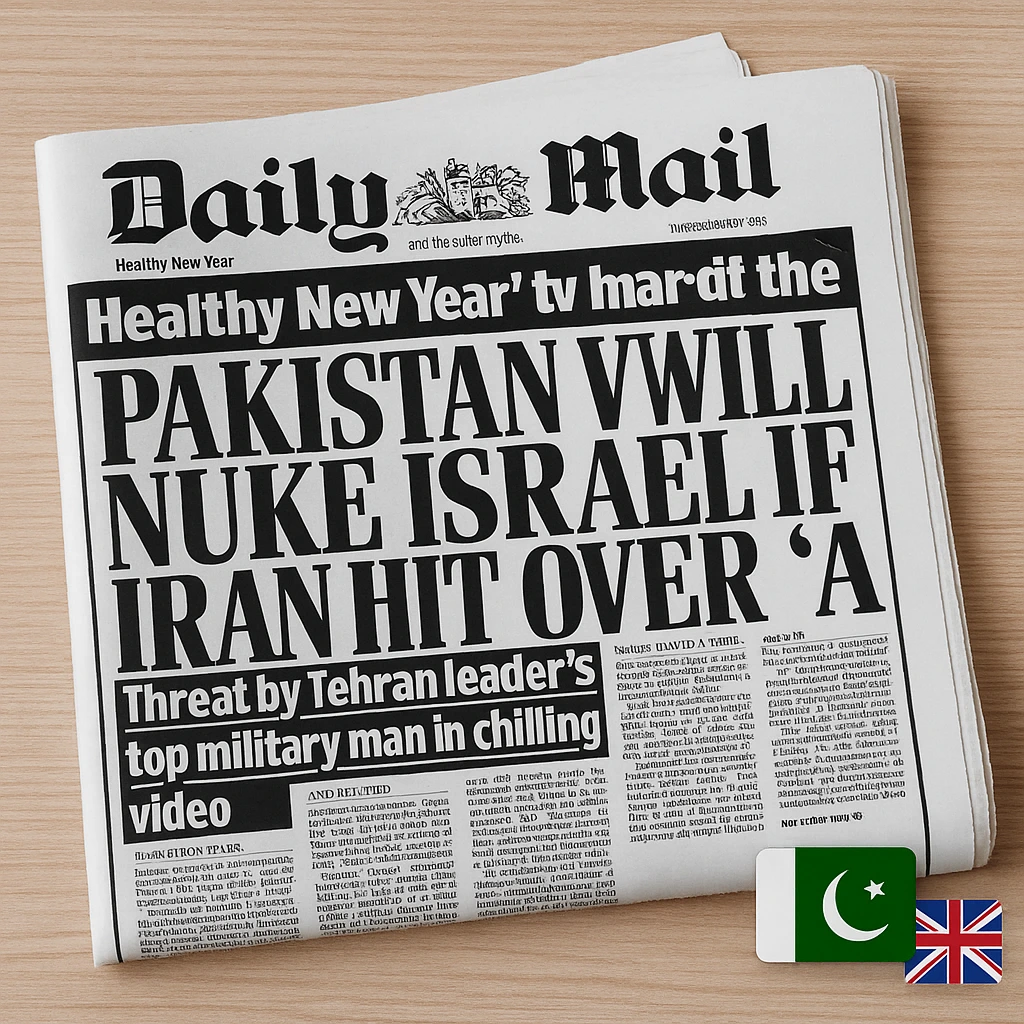Pakistan Refutes Daily Mail False Nuclear Strike Allegations
 Pakistan Refutes Daily Mail's False Nuclear Strike Allegations One Nation Voice
Pakistan Refutes Daily Mail's False Nuclear Strike Allegations One Nation Voice
Pakistan Refutes Daily Mail’s False Nuclear Strike Allegations
An article authored by the Daily Mail of the UK, published on June 13, 2025, claimed that Pakistan had promised to attack Israel with nukes in case Iran was attacked using nuclear weapons. It was based on a video of an Iranian IRGC official, Mohsen Rezaei, which, the Daily Mail had reported, showed such an assurance. The article was, however, moved down by the Minister of Foreign Affairs of Pakistan, Ishaq Dar, who termed the article as false, dangerous, and one made through a doctored AI-generated video. The government has categorically denied the allegation, with the focus being that there was never any such nuclear undertaking that was extended to Iran.
This event demonstrates the possible harm that a spread of false information can cause, especially involving delicacy in geopolitics, like the case of nuclear diplomacy. The Daily Mail went ahead and intensified the AI-created video without adequate checking, which is a major failure of journalistic duty. In an era of deepfake technologies and AI-based generated material easily modifying reality, it is vital to ensure that the media sources.
Notably, even Iran failed to substantiate the Daily Mail. Such unverified information can confuse, especially in international relations, through its propagation. Since nuclear diplomacy is a sensitive subject, misleading information on the same may lead to far-reaching effects that may ruin relations between countries.
The Pakistani government outrightly denied that any such promise had been given to Iran and considered the report by the Daily Mail as irresponsible and untrue. Foreign Minister Ishaq Dar also raised the question that the article caused unnecessary confusion on international platforms and further made diplomatic relations difficult. Pakistan, which follows a policy of strategic restraint and responsible diplomacy, found the claim of the Daily Mail to be not only unfounded but also a possible start of unneeded geopolitical tensions. It is pertinent to note that Pakistan has never had any policy of nuclear weapons but has had a policy of strategic restraint.
The Foreign Office has shown that they are considering prosecution against the Daily Mail, with the action being necessitated by the fact that such a move could have dire consequences in terms of destabilizing regional security by fabricating information to an extent that it destroys the credibility of the same. On the one side, it is crucially important to ensure press freedom; on the other hand, it is also important to realise the power of the media and the responsibilities that come along with it, especially when it comes to topics that may pose a certain threat to peace.
This is not the first occasion. Most recently, Daily Mail mistakenly reported there were 50 hostages killed in a rescue mission in Pakistan, back in March of 2025, which was later debunked by Pakistan authorities. Such incidents call into question how the newspaper handles the reporting of facts and whether it would value the need to be more sensational than the news.
Its latest action with the Daily Mail also proves that the media needs verification, as it shapes public perception and affects relations in every domain. The article misrepresented the position of Pakistan, but it also dragged the country into a very delicate nuclear situation that might have affected international relationships. This proves the ever-rising role of verification of sources prior to publication of materials that could have adverse effects on international security.
Finally, this event represents a lesson on how drastically the influence of media sources can be in shaping public discourse and international relations. As much as the press remains a very important instrument in the delivery of information, it should be within the framework of accountability, and this is specifically so in matters that are quite sensitive and tricky, such as the matter of nuclear security. The reaction of Pakistan to this act shows how misinformation can be very dangerous, and the inability of the Daily Mail to provide accurate reporting in this case shows the need to punish media companies for the result of their actions. Going into the future, the media needs to make a move toward integrity of facts, as this is the only way to go when we are dealing with the lives of many people worldwide and security issues.








